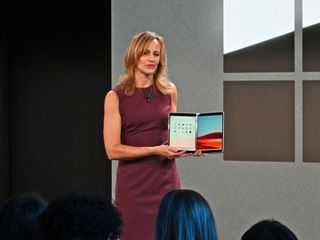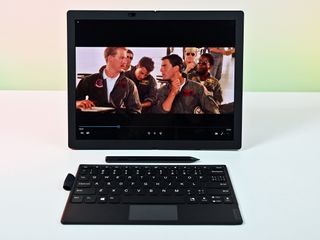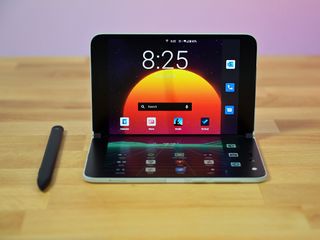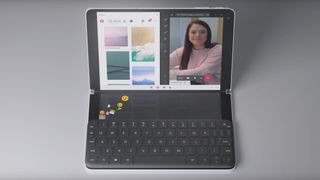Should Microsoft just put Android on Surface Neo?
With Surface Neo's hardware not doing much these days, putting Android on it may be the best option.

In October 2019, Microsoft wowed the tech world with two new devices: Surface Duo and Surface Neo. Both were similar devices with dual screens, but Surface Duo was a phone running Android while Surface Neo was meant to be a new era of PC running Windows 10X — itself a new OS built for the experience.
A lot has changed since that fall. Surface Duo did come out nearly a year later, but it had a very rough start (something that has finally improved with Surface Duo 2). But Surface Neo, which was also supposed to come out "holiday 2020," never materialized.
Much of Surface Neo's limbo status is due to the abandonment of Windows 10X. As the pandemic gained ground, Microsoft refocused and doubled down on its desktop OS, merging the design of Windows 10X into a new OS dubbed Windows 11. The strategy worked: Windows 11 is a hit and has helped to reinvigorate the PC industry at the right time.
But what should happen with Surface Neo's hardware? Should Microsoft just put Android on it and make it a bigger brother of Surface Duo? There are some excellent reasons to do so. And a few reasons why it shouldn't.
Foldable PCs are a lot bigger

The first foldable PC is Lenovo's ThinkPad X1 Fold. It's a device that I play with occasionally, but I have had difficulty getting into my workflow. When opened, the X1 Fold's 13.3-inch flexible QXGA (2048x1536) OLED is super impressive, but it's just too small to use as a laptop. Despite the appeal, it's also not light at 2.2lbs (999g), making it not that comfortable to hold as a book for long periods.
Interestingly, the next-gen of foldable PCs arriving later this year are much more significant. These will feature screens in the 16 to 17-inch range (e.g. ASUS ZenBook 17 Fold) and, when folded as laptops, will be closer to a 13-inch one making them a bit more natural. While you won't want to hold a 17-inch folding PC for long in one hand, you could prop the screen up to have a portable 17-inch PC with you, which is intriguing.
On the other hand, Surface Neo features two 9-inch screens that create a 13.1-inch one when fully spanned. It bucks the trend of where foldable PCs are headed.
Get the Windows Central Newsletter
All the latest news, reviews, and guides for Windows and Xbox diehards.
And there's still this lingering issue: Windows 11 is not great as a tablet OS. And, as of right now, there are no features in Windows 11 that leverage dual- or foldable displays (although Snap Assist helps).
In short, while I find foldable PCs curious, my X1 Fold experience has left me skeptical of its usefulness as a laptop replacement. Microsoft is going to have to do much more to convince me otherwise.
Surface Neo with Android could make sense

With no Windows 10X on the horizon, the case for a dual-screen PC seems to fall flat as the OS is not optimized for it. Technically, neither is Android, but that's changing with Android 12L due later this year. Moreover, Microsoft already has experience improving Android for dual screens with Surface Duo and Surface Duo 2. In fact, it's getting pretty good at it. With Android app development poised to start optimizing for a larger screen, dual-screen, and foldable displays, the ecosystem is ahead of where Windows is right now.
Now, I'm no fan of Android on tablets, but tossing that OS onto Surface Neo with a dash of 5G makes the Surface Neo a lot more viable. Microsoft could still preload it with its growing cadre of Android apps and services, and, in effect, it'd just be a giant Surface Duo for those who want more screen real estate on the go. That's an easier sell, especially for those who desire a secondary device and don't want to replace their phone.
Related to this, Microsoft has made some recent moves to consolidate its Android efforts. Its latest reorg puts Android development as a core within the larger Microsoft Devices and Experiences group. It also seems to be hiring many more Android developers. In other words, its ambitions in the Android space seem more extensive than its current offerings.
A dangerous game?

Of course, the risks here are not lost on me either, especially for Windows. In a previous 2019 interview with The Verge, executive VP and Chief Product Officer, Panos Panay asks "… what's the right operating system for the form factor?" when talking about Surface Duo. He answers his question with "…in this case, on mobile devices, Android's the obvious choice. But anything above that, Windows is everything." Later, when asked about putting Android on Surface Neo, Panay has an interesting response:
Yeah, I don't see that. I can see my road map. I can see it three years out, and I'm not, like, "I've had visions." I can, like, physically see it, the road map. We have every iteration of these products out there. I think what you're saying is not where I'm seeing things.At the end of the day, Windows is doing its job well. It's incredible, literally for anything bigger than this device. Now, anything bigger in between Neo and Duo, I think, is stuck. So when I say anything bigger, I don't see anything smaller than 2.9 inches, and I don't see anything bigger than this. When we picked this product, we literally looked for years at screen sizes. What's the right thing to do?
Panay doubles down on Windows as the right choice for Surface Neo. But those comments were made before Windows 10X was axed, and the decision to push 17-inch foldable PCs came to light. How has thinking evolved now that those things have changed? Of course, we may never know unless Microsoft decides to resurrect Surface Neo either with Android or some optimized version of Windows 11.
But if Microsoft pursues Android, the risk is evident as it starts to bleed into the area where Windows is supposed to be dominant and undercuts previous messaging. It also acknowledges what is becoming more and more apparent: Android is the superior mobile OS, whereas Windows is the better desktop (and proper laptop) solution.
This discussion raises the fundamental question: What is Surface Neo — a tablet or a laptop? Because how you answer determines which OS is the better fit.
So, what to do about Surface Neo? I'm not entirely sure. Ideally, Microsoft would have a fantastic mobile version of Windows optimized for dual screens ready to go. But they don't, and we haven't heard anything to suggest they do. That's the reality here. While far from my first choice, Android makes sense from a development and marketing point of view, especially if you think of Neo as a tablet or just a bigger Surface Duo rather than a laptop.
On the other hand, maybe Surface Neo should not exist at all — it's a device too in-between to be anything.

Daniel Rubino is the Editor-in-chief of Windows Central. He is also the head reviewer, podcast co-host, and analyst. He has been covering Microsoft since 2007, when this site was called WMExperts (and later Windows Phone Central). His interests include Windows, laptops, next-gen computing, and watches. He has been reviewing laptops since 2015 and is particularly fond of 2-in-1 convertibles, ARM processors, new form factors, and thin-and-light PCs. Before all this tech stuff, he worked on a Ph.D. in linguistics, watched people sleep (for medical purposes!), and ran the projectors at movie theaters because it was fun.
